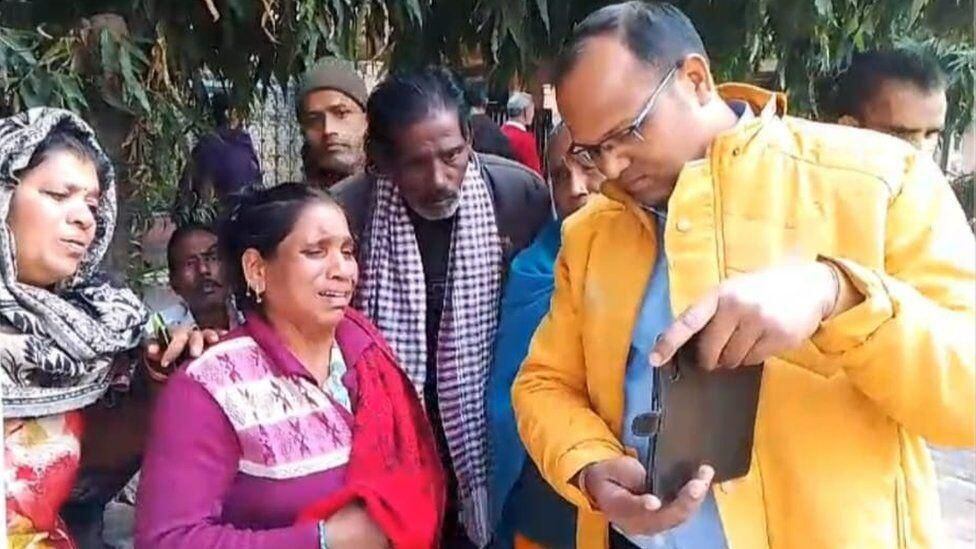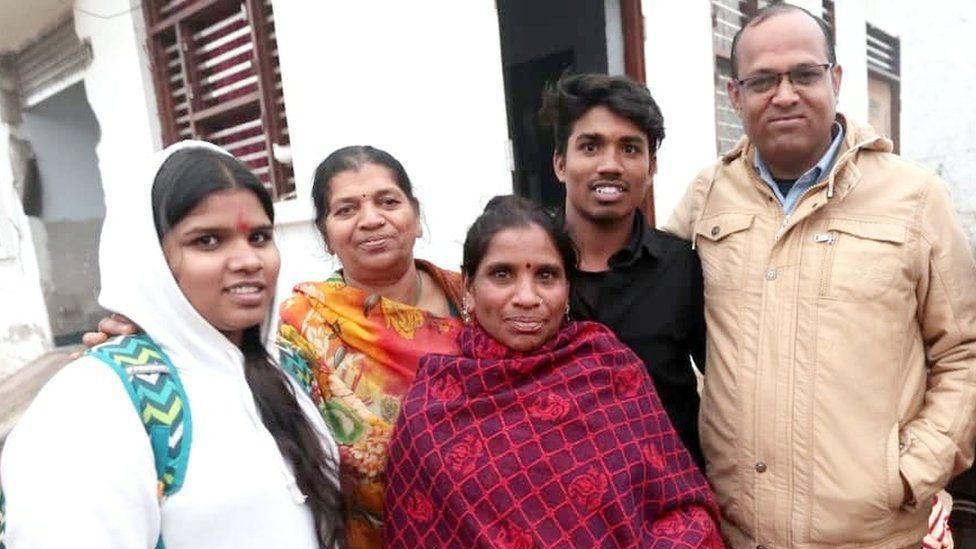On a hot summer day in June 2010, two Indian children left home, angry at their parents for hitting them.
Brothers Rakhi11 years and Bablu, aged 7, planned to go with her maternal grandparents, who lived just a kilometer away. But after a few wrong turns, they got lost.
LOOK: The multimillion-dollar compensation that Haiti paid to France for its independence
It took them over 13 years to find their way back to their mother, Neetu Kumari (with a lot of help from a child rights activist).
“I missed my mother every day,” Bablu, who grew up in orphanages, told me over the phone. “I’m very happy now that I’m back with my family.”
The video of their reunion in late December shows Neetu sobbing as she welcomes Bablu home, hugging him tightly and thanking God for “giving me the joy of hugging my son again.”
Bablu then hugs Rakhi, who had returned home two days ago. Although the brothers had been in contact for a few years, They met again after more than a decade.
Separation
Bablu and Rakhi lived in the northern city of Agra with your parents Neetu Kumari and Santoshwho worked as day laborers.
June 16, 2010 Neetuwho was unable to find a job that day, took out his frustration on Rakhi and hit her with metal tongs he used for cooking.
Rakhi and Bablu They left the house after their mother went out to do something.
“My father would also beat me sometimes if I didn’t study law, so when Rakhi came and said let’s live with grandma, I agreed,” says Bablu.
After they got lost, a pedicab driver took them to the train station.
There, the children boarded a train where they were discovered by a woman who worked at a children’s charity.
When the train reached Meerut, a city nearly 250 kilometers from her home, she handed them over to the police, who took them to a government orphanage.
“We told them we wanted to go home, we tried to tell them about our parents, but the police or the orphanage staff They didn’t look for our family,” says Bablu.
A year later, the brothers were also separated: Rakhi was transferred to an NGO-run girls’ shelter near the Indian capital, Delhi.
A few years later, Bablu was transferred to another government orphanage in Lucknow, the capital of Uttar Pradesh state.
The brothers meet again
Whenever important officials, charity workers or journalists visited the orphanage, Bablu would tell them about Rakhi in the hope of meeting her.
But it was only in 2017 that this had results. One of the caretakers at the new shelter decided to help him when he told him that his sister had been sent to an orphanage for older girls somewhere near Delhi.
“He called all the orphanages in Noida and Greater Noida (Delhi suburbs), asked if they had anyone named Rakhi and after a lot of effort, he found her,” says Bablu.
“I want to tell the government that it is really cruel to separate brothers. They must be housed in centers close to each other. It’s not fair to separate them“, To add.

After the brothers met, they often talked on the phone. But every time the conversation turned to meeting her family, Rakhi hesitated.
“Thirteen years is not a short time and I had little hope that we could find the mother“, told me.
Bablu had no such doubts. “I was very happy to meet Rakhi and also confident that now I would be able to meet our mother too,” he said.
In one of the places where he stayed, Bablu says, he was frequently beaten by caregivers and older children. He says he tried to escape twice, but then got scared and came back.
Rakhi, on the other hand, points out that the NGO she grew up in took good care of her. I ask if he thinks her life would have been different if she had stayed at home.
“I think everything that happens is always for the better and maybe I would have a better life outside of home,” he says.
“I didn’t belong to them, but they still took good care of me. No one ever hit me and they treated me well. I went to a good school, had access to good healthcare and all the other facilities you have access to. of a big city”, he adds.
The activist who brought the family together
On December 20, Agra-based child rights activist Naresh Paras received a call from Bablu, who now lives and works in Bengaluru.
“You have brought together many families, could you help me find mine?” Bablu asked him.
Paras, who has worked with children since 2007, says it was not a simple case.
Brothers They didn’t remember their father’s name. and their government-issued Aadhaar cards had different names.
They had no idea which state or district they came from and the orphanage registration indicated they were from Bilaspur, a city in the central state of Chhattisgarh.
Paras’s calls to orphanages and the police in Bilaspur yielded no results.

Then there was a breakthrough when Bablu remembered seeing a fake locomotive outside the station where they had boarded the train.
“I knew it had to be the Agra Cantonment station,” says Paras.
Checking the city’s police records, he zeroed in on the Jagdishpura police station, where the brothers’ father had lodged a complaint in June 2010.
But when he went to look for his family, I found out they were renting there and moved out.
Rakhi then told him that she remembered that her mother’s name was Neetu and that she had a burn scar on her neck.
Paras went to the Workers’ Crossroads, a place in Agra where workers gathered every morning in the hope of finding work.
He didn’t find Neetu, but some workers said they knew her and would pass on the message to her.
As soon as Neetu Kumari learned that her children had been found, she went to the police, who contacted Paras.
Reunited after 13 years
When Paras visited Neetu, she showed him photos of the children and a copy of the police complaint. When he connected her via video call with Bablu and Rakhi, everyone recognized each other.
Neetu Kumari told Paras that she “was sorry for hitting Rakhi” and also spoke of the efforts she made to find her children.

“I borrowed money and traveled to Patna (capital of Bihar state) after hearing that my children were seen begging on the streets there. I visited temples, mosques and churches to pray for his safe return,” he said.
He said this with The reunion – emotional to the point of tears – with his children took on new life.
Rakhi said she felt like she was “in a movie” because she never expected to see her mother again. “I felt very happy,” she added.
But Bablu described his feelings as “contradictory”.
“It’s amazing that it only took Paras a week to find my family. I was angry at the police and NGO workers who didn’t help me despite repeated requests, but I was very happy talking to my mother. ‘Why did you leave me?’ I told him, ‘I never left you. I got lost.'”
Source: Elcomercio
I am Jack Morton and I work in 24 News Recorder. I mostly cover world news and I have also authored 24 news recorder. I find this work highly interesting and it allows me to keep up with current events happening around the world.

:quality(75)/cloudfront-us-east-1.images.arcpublishing.com/elcomercio/HTC32M5GFJABDN63CPYFCKBSFI.jpg)

:quality(75)/cloudfront-us-east-1.images.arcpublishing.com/elcomercio/KHRSVXMA7FDZDJQ4YRQJMTBDDM.jpg)

:quality(75)/cloudfront-us-east-1.images.arcpublishing.com/elcomercio/34K4SMDZBBFPLPBWFLVVNLYR44.jpg)

